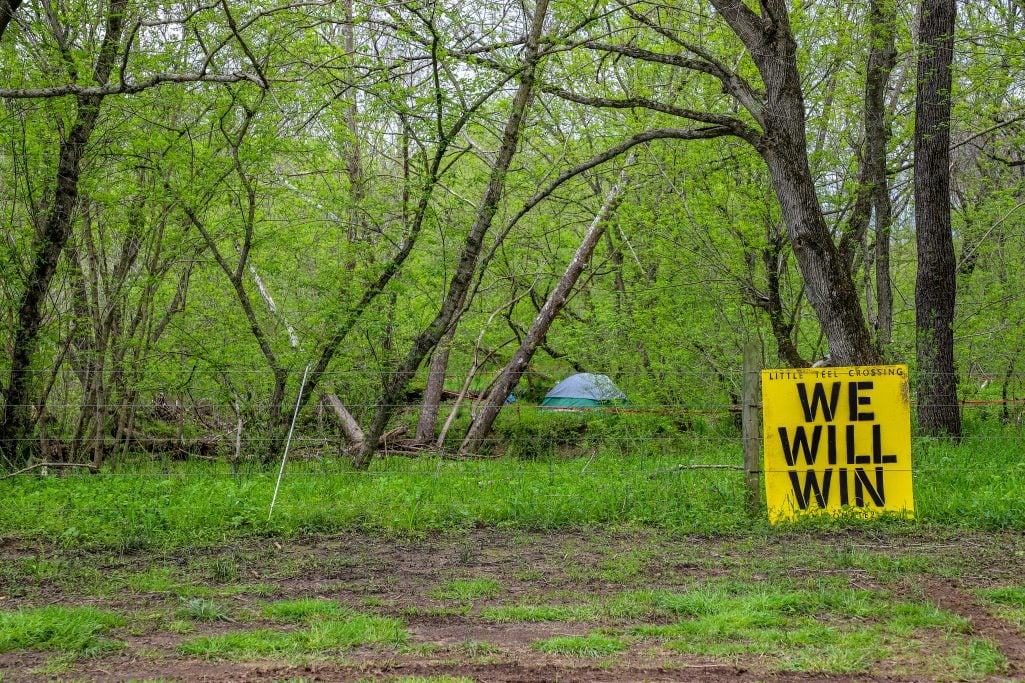“I miss my house. I really would not have traded it for a piece of plywood if this were not important,” shouted Red Terry, high above her property in a tree-sit on Bent Mountain this past April. Theresa “Red” Terry lives in an “active crime scene,” according to law enforcement.
Along with other activists, she and her daughter, Minor Terry, are seeking to prevent construction of a 300-mile long, 42-inch wide natural gas pipeline that would cut through Jefferson National Forest. They took to the trees after an ongoing four-year legal battle that climaxed this January when a federal judge ruled in favor of Mountain Valley Pipeline, LLC, clearing the way for pipeline construction.
This article originally appeared in RVA #33 Summer 2018, you can check out the issue here, or pick it up around Richmond now.
“Most people [the pipeline] was affecting have been busy doing lawful things for three years, and it’s gotten them nowhere,” Red said. “When they gave the permission to cut on my property, that’s when I decided to go up [the tree]. It’s gotten attention a lot faster than doing things the right way.”


Landowners occupy shelters in the trees above their land in protest of the Mountain Valley Pipeline proposed for construction in Franklin County, Virginia.
Red and Minor were found in contempt of court for their protest, and have been charged with three misdemeanors, including impeding work and trespassing. Living on separate tree platforms in two different locations, they are both near the creek that runs through their property. The pipeline company claims their protest halted tree cutting, but the Virginia Department of Environmental Quality has forbidden MVP to cut trees within 75 feet of any waterway for the season due to the spawning season of the Roanoke logperch, a federally-designated endangered species.
“If I weren’t here, they would cut anyway,” Minor said. She’s the seventh-generation landowner on the Terry property. Both state police and Global Security, a private firm hired by MVP, share a tent while camping outside the tree sits. The women are issued state-provided food, which includes two bologna sandwiches, a bag of apple juice, water, and two cookies–food described as meeting all their ‘nutritional needs.’
The protests gave MVP grounds to request an extension to DEQ’s original tree cutting deadline of March 31 to May 31, which DEQ and other federal agencies granted. Originally, this deadline was set to protect bat and migratory bird habitats.
“The path that this pipeline will be going through, the terrain is unreal,” Minor said. “It’s steep slopes, mountainsides, waterways, creeks and streams, and wetlands. And some of these slopes are too steep to even stand on, and they want to bring in machinery and blast through it and bury a giant pipeline.”


According to Dr. Hearst Kastning, a karst landscape expert, pipeline leaks are likely to occur due to the high degree of seismic activity in this region of Appalachia. Landslides are also common here, and Kastning says they’re likely to increase when the trees preventing erosion are removed.
“Karst, in general, is one of the most sensitive landscapes in the environment. In a karst landscape, there are a lot of fractures and openings,” Kastning said. “Caves allow a lot of water to go through, fast, and unfiltered. Because of that, if the pipeline goes over karst, there are no guarantees it will be alright because we don’t know where it will redirect the water… Once operational, if it springs a leak or breaks, that would contaminate the groundwater for quite a distance.”
On Carolyn Reilly’s property, a working farm in Franklin County, an anonymous group has taken to the trees to protect her land. Reilly, a longtime pipeline fighter, faces contempt of court charges for allowing them to remain.
“We call ourselves grass farmers,” Reilly said about her property, where she’s trying to improve soil quality through traditional agricultural practices. She contrasted that with MVP, describing them as “extractive, and all about claiming space.” She said MVP is “working it to death and then moving on. That doesn’t honor life at all.”
The Reillys and the Terrys have been fighting the MVP for the past three and a half years, engaging in government meetings, community forums, and an endless string of lawsuits. Both families are part of individual lawsuits against FERC and state agencies, as well as group lawsuits through organizations like Bold Alliance, the Sierra Club, and the Southern Environmental Law Center. The process is long and messy.


“Bringing these appeals is a relatively recent development,” said Carolyn Elefant, the pipeline lawyer for Bold Alliance. “There had always been a handful of challenges to certificates over the last 20 years, but generally parties didn’t have resources, or they just gave in to the project. It’s really only been in the past five years these cases have started to go forward.”
Many of these lawsuits have no precedent, making for a new legal environment. The process for companies is becoming more tedious since, in addition to receiving a certificate from FERC, the section 401 water quality test from the State Water Control Board, and approval from the Forest Service, they are being met with lawsuits from almost every impacted landowner.
While this may be a headache for companies like EQT Midstream Partners, partners involved with MVP; or Dominion, who controls the Atlantic Coast Pipeline project; it poses more serious challenges to rural landowners who lack the resources to fight back.


Elefant said the bias favors construction, since, “when a court looks at the decision, it presumes that the agency ruling is correct, and it tends to defer to many of the factual determinations that the agency made.” Even when alternate routes are proposed, she said, “the court is going to assume that FERC’s decision was probably right based on its expertise.”
In 2016, protests against the Dakota Access Pipeline at the Standing Rock Indian Reservation highlighted the power that corporations wield in these interactions. While the MVP does not disrupt Native American land, the proposed pipeline will cause irreparable damage to woodlands and historic farmlands, in an area as sparsely populated as Standing Rock.
“They had no right to come through here and pick land they knew they wouldn’t get much fight from,” Red Terry said. “Older people, retiring people. We’ve had this land pretty much natural for seven generations, and we want to keep it that way.”
Energy companies have continually targeted populations that lack widespread social power. They are small, agrarian communities that feel ignored by their political representatives and lack the resources to stop a project headed by large corporations, many of which donate to Virginia’s political parties. According to the Virginia Public Access Project, Governor Northam has accepted over $199,251 from Dominion alone, something that critics say suggests government bias.


“DEQ has a history of aligning with industry over the public interest, and that was no more clear than in the agency’s industry-friendly handling of the Atlantic Coast and Mountain Valley pipeline permits in 2017,” Peter Anderson, Virginia Program Manager with Appalachian Voices, said in a statement. Last year, former Governor McAuliffe signed a $58 million mitigation plan with Dominion, releasing them from any potential damages to Virginia’s forests by the ACP, while Governor Northam remains passive toward pipeline questions, and publicly reprimanded Red Terry for her protest.
Elefant predicts these cases will go to the Supreme Court. In addition to the constitutionality of a private corporation using eminent domain, several other new legal issues are introduced, such as the environmental impact inflicted by this project.
“This has been happening for generations,” Reilly said. “This whole country was founded on taking what belongs to other people. I feel like this is corporate colonization happening.”
In May, the Terrys had their court dates, almost a month after Red and Minor took to the trees.
“I don’t understand how industry can look at these plans, look at whatever information that’s been given to them, and thought this was a good idea,” Minor said. “They thought this was going to be safe, that the damage would be minimal. I’m angry. I’m so angry.”
The tree-sitters believe the lengths they have gone to protect the land are absolutely necessary. They have endured rain, high winds, freezing temperatures, snow, heat, constant interrogation, police surveillance, and really bad bologna sandwiches.
“We need to be clear with ourselves that this structure of law enforcement is to serve this company over the power of the people,” said a Reilly property tree-sitter, who went by the pseudonym Alex. “I know that this is a way, at least for a time, to stop the construction. They’re getting scared now.”


U.S. District Judge Elizabeth Dillon found the Terrys in contempt of court and ordered them to evacuate their trees by midnight the next Saturday. If they did not comply, they would be fined $1,000 per day – fines that would be given directly to MVP, LLC. Red’s husband, Coles Terry III, was fined $2,000 for being in contempt for supporting his wife and daughter.
MVP lawyers told the judge that the delays caused by the Terrys so far have cost the pipeline more than $15,000, and that security efforts around the tree-sitting zones cost more than $25,000. MVP’s construction manager testified the alleged financial damages would grow exponentially if crews could not finish tree clearing by the May 31 deadline.
“There are more ways to fight,” Alex said. “Determined people, organized people can still do something. We have our voice, we have each other, and if we wedge those things in the right places, new possibilities can be born.”
Even after the ruling was reached, Alex and the others remained on the Reilly property until the end of May.
“If you look closely enough, if you are really present, then you can find the whole world here,” Alex said. “Defending this place is about that, but there is a global context here. This is a farm and a family that have built their livelihood here.”
Carolyn and her husband have done everything they could to protect their land and their farm from a corporate enterprise, not only affecting their lives and their children’s lives, but the entire community around them. Eminent domain has stripped them of that right, while the Reillys have to worry whether they will be able to continue farming, out of fear for their soil and waterways.
Hundreds of miles away, men in a corporate office in Pittsburgh have permanently affected the way a little girl sees the world.
“It’s totally permeated every pore of our family,” said Reilly, mother of four, who now worries for her children’s future due to legal costs imposed by the court after a guilty ruling. “She’s eight, our youngest. She’s known this since she was five. This is all she’s known. Her whole perspective is based on, ‘Are you for or against the pipeline?’ She’ll ask me, ‘That person you were just talking to, are they for or against it? What do they think about it?’ Basically, are they for us or are they not for us? Where do they stand with us?”
The Reillys, the Terrys and hundreds of other landowners continue to fight both the ACP and the MVP. Both projects continue to face considerable obstacles, such as mid-May storms, which prompted DEQ to cite environmental violations and halt construction due to severe erosion that would pollute waterways. MVP predicts the project will be complete by the fall of 2018.
READ MORE: At the end of last month, the 4th Circuit Court of Appeals struck down two important decisions that allowed the Mountain Valley Pipeline natural gas line to cut through the Jefferson National Forest this past Friday.



